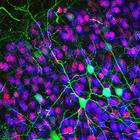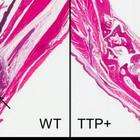UN: Stopping Zika May Require Genetically Modified Insects
February 17, 2024 9:53 am | by Jamey Keaten and Maria Cheng, Associated Press | News | CommentsThe World Health Organization says it may be necessary to use controversial methods like genetically modified mosquitoes to wipe out the insects that are spreading the Zika virus across the Americas.
Study: Neanderthal DNA May Influence Modern Depression Risk
February 12, 2024 9:46 am | by Malcolm Ritter, AP Science Writer | News | CommentsA new study says a person's risk of becoming depressed or hooked on smoking may be influenced by DNA inherited from Neanderthals.
New Drug Target for Rett Syndrome
February 8, 2024 10:13 am | by Harvard University | News | CommentsResearchers have identified a faulty signaling pathway that, when corrected in mice, ameliorates the symptoms of Rett syndrome, a devastating neurological condition. The findings could lead to the discovery of compounds or drugs that may benefit children affected by the disease.
Discovery: Many White-tailed Deer Have Malaria
February 8, 2024 9:53 am | by University of Vermont | News | CommentsTwo years ago, Ellen Martinsen, was collecting mosquitoes at the Smithsonian's National Zoo, looking for malaria that might infect birds--when she discovered something strange: a DNA profile, from parasites in the mosquitoes, that she couldn't identify.
Race Should be Removed from Genetics Research, Paper Contends
February 8, 2024 9:40 am | by Seth Augenstein, Digital Reporter | News | CommentsRace should no longer be used as a distinguishing factor in human biology and genetics research, contends a new paper in Science.
Natural Protein Points to New Inflammation Treatment
February 5, 2024 10:42 am | by NIH/National Institute of Environmental Health Sciences | News | CommentsIncreasing the level of a naturally-produced protein, called tristetraprolin (TTP), significantly reduced or protected mice from inflammation, according to researchers. The results suggest that pharmaceutical compounds or other therapeutic methods that produce elevated levels of TTP in humans may offer an effective treatment for some inflammatory diseases, such as rheumatoid arthritis, psoriasis, and multiple sclerosis.











